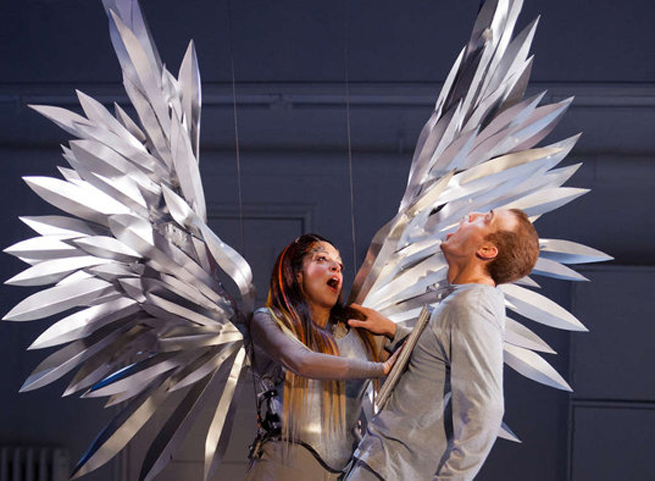
Angels in America, Part One: Millennium Approaches by Tony Kushner; Blanka Zizka directed at the Wilma Theater, 2012.
Now that AIDS is no longer immediately fatal, the original theme of Angels in America isn’t as shocking. Instead we look to it for broader themes, which Tony Kushner’s script fortunately provides. It’s funny, too.
From the exclamations of surprise from the audience, to comments I overheard in the lobby, it’s clear that many attendees at the Wilma had never before seen Angels in America. So I’ll try to put myself in their shoes and view this play freshly.
What attracted attention in 1990 was the play’s graphic look at men dying from AIDS. Now that many of us have friends who’ve lived with AIDS for years, that theme isn’t as shocking. Instead we look for a broader subject matter, and Tony Kushner’s script supplies it.
Additional themes now become apparent. Angels deals with politics, religion, loyalty, guilt, the failure to live up to expectations — even the examination of a Mormon family, relevant thanks to Mitt Romney’s presidential candidacy.
Watching the torment of Louis, who deserts his lover because he can’t deal with the illness, I re-lived the anguish of seeing friends die at young ages. Angels portrays the different ways men face death, and demonstrates how excruciating end-of-life can be.
Also standing out is the play’s rumination on the meanings of freedom. For the power broker Roy Cohn, it’s how to bend the law for personal profit; for the Reagan administration, it’s “our” side in opposition to the Soviet Union; for gay men, it’s the ability to choose their own partners and to reveal themselves publicly.
Kushner’s script ranges from poetic to conversational and from portentous to comic. This production, directed by Blanka Zizka, made me aware of just how funny some of the characters are. These people laugh at themselves with gallows humor.
The story revolves around two couples: Joe Pitt, an attorney, who deserts his wife Harper and starts cruising the streets of Manhattan to pick up men; and Prior Walter, dying of AIDS, whose long-time lover, Louis, deserts him. What elevates the play isn’t the plot development (Joe and Louis predictably find each other) but Kushner’s grasp of language and his fascinating subplots.
Prime among these is the saga of Cohn, the real-life attorney, a closeted gay man who died of AIDS while insisting he didn’t have it. Cohn is visited by the ghost of Ethel Rosenberg, whom Cohn detested. More than half a century has passed since Cohn and Rosenberg were in the news, and some audience members may not grasp their historic significance. But Cohn (powerfully played by Stephen Novelli) dominates the stage with his outrageous profanity.
One scene stands out as especially relevant today: a long conversation between the well-meaning liberal Louis (Benjamin Pelteson) and the black nurse Belize (James Ijames.) Louis babbles platitudes and Belize nails him as a racist. The confrontation is particularly jarring because Louis appears to be a stand-in for Kushner.
The other parts are perfectly cast and well played. Prior Walter is affectionately portrayed by Aubrey Deeker. Luigi Sottile as Joe displays rugged male-model looks reminiscent of the young Mitt Romney, and Kate Czajkowski as Harper pulled the neat trick of getting us to love a nutcase who’s also an addict.
The set captures the play’s epic scope as it unfolds over great distances of time and place, with wide expanses of off-white walls and furnishings. Then Zizka narrows the focus to individuals and couples with quick movements of the furniture and vivid use of lighting — glaring white, or hot red or spooky blue — and dramatic use of shadows.
The lighting by Russell H. Champa, set by Matt Saunders, costumes by Oana Botez and sound design by Christopher Colucci enhance the drama.